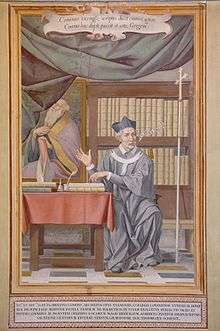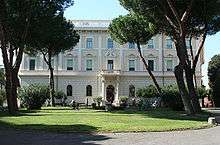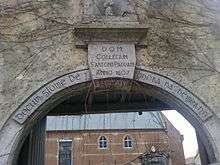Irish College
Irish Colleges is the collective name used for approximately 34 centres of education for Irish Catholic clergy and lay people opened on continental Europe in the 16th, 17th and 18th centuries.



History
The Colleges were set up to educate Roman Catholics from Ireland in their own religion following the takeover of the country by the Protestant English state in the Tudor conquest of Ireland. Irish Catholics also left the country to pursue military careers in the Flight of the Wild Geese.
The first Irish Colleges were set up in Spain in the 1580s in Salamanca and Madrid under the supervision of the Jesuit priest James Archer.
There were several early Irish Colleges in Southern Netherlands. St. Patrick Irish college of Douai was founded in 1603 by Christopher Cusack, with the support of Philip III of Spain. The Irish College at Douai was integrated to the Faculty of Theology of the University of Douai in 1610. St Anthony's College, the Irish Franciscan College in Leuven, was co-founded in May 1607 by Aodh Mac Cathmhaoil (also known as Aodh Mac Aingil) and Flaithri Ó Maolconaire, Irish Franciscan, theologian and aide to Aodh Ruadh Ó Domhnaill. The College was founded under the patronage of Philip III of Spain. There was also an Irish Dominican College at Leuven from 1624 until 1797.[1]
The Irish College in Paris was co-founded in 1605 by John Lee and John de l'Escalopier, President of the Parliament of Paris.
More Colleges were established in Rome (1625), Toulouse, Bordeaux, Nantes, Lille, Brussels, Antwerp and then Prague (1631).[2] Some of the Colleges fell out of use in the late 18th century as the Penal Laws against Roman Catholics in Ireland were relaxed.
Irish colleges were important centres for the writing of Irish history and the preservation of Ireland’s rich cultural traditions. Mícheál Ó Cléirigh was sent from an Irish college to Ireland to compile the Annals of the Four Masters, an important chronicle of Irish history. Within the colleges, printing press in the Irish language were established and a collection of the lives of Irish saints was produced. Irish colleges were also helpful for the Irish resistance during the Nine Years' War in Ireland and later exile on the European continent.
On 16 October 1802, Irish colleges located in Toulouse, Bordeaux, Nantes, Douai, Lille, Antwerp, Leuven and Paris were merged under a unique administration, alongside the Scottish College in Douai and Scots College in Paris.
In 1951 The Salamanca Archive, documents relating to the Irish Colleges in Spain were given to the Irish Church and deposited in St. Patrick's College, Maynooth.[3]
In the last decade, the Irish Government has financed the renovation of the premises of the Irish College in Paris which now serves as an Irish Cultural Centre and a residence for Irish students, writers and artists. The Pontifical Irish College in Rome continues to be used for the education and training of Roman Catholic clergy. In 1983 the Irish College in Leuven was made available by the Irish Franciscans for development as a secular resource. The Leuven Institute for Ireland in Europe is now located on the premises.
List of Irish Colleges
Italy
- Sant’Isidoro a Capo le Case – was established in 1624 as the training center for Franciscan friars from Ireland
- Franciscan novitiate in Capranica near Sutri, established in 1656
- Irish Augustinian College, (1656-1661) and from (1739-1798)
- San Clemente in Rome, housed the Irish Dominican College.
- Pontifical Irish College, Rome (Italy) – trains priests from Ireland and other countries
France
- Douai – founded in 1603 by Fr. Christopher Cusack.
- Paris – now the Irish Cultural Centre
- Toulouse – established in 1660.
- Bordeaux – established in 1603.
- Nantes – established in 1680.
- Lille – established in 1610 by Ralph Cusack, confiscated in the French Revolution and sold in 1793.
- Poitiers – Jesuit Institution established in 1676.
- Sedan
- Boulay - was established by the Irish Franciscans in 1700, under the patronage of Leopold, Duke of Lorraine.
- Charleville - established by the Capuchins in 1620.
- Rouen - established in 1689.
- La Rochelle - established by the Carmelites in 1665.
- Aix-la-Chapelle - established by the Carmelites in 1677.[4]
Lille and Douai were part of the Spanish Netherlands when they were established.
Belgium
- St Anthony's College, Leuven (Franciscan) – in 1607, now the Leuven Institute for Ireland in Europe
- Holy Cross, Irish College Louvain (Dominicans), in 1626.
- Pastoral College in 1693, closed in 1795 following French occupation.[5]
- Brussels
- Irish College, Antwerp, opened circa 1600, redeveloped in 1629 by Lawrence Sedgrave, closed in 1795.[5]
- College of Tournai, founded circa 1616 by Maximian de vianni.
Portugal
- Irish College, Lisbon
- College of Corpo Santo, Lisbon, was set up for the education of Irish Dominican priests[6]
Spain
- Irish College of San Jorge at Alcalá – founded circa 1590, merged into Salamanca in 1785
- Irish College, Madrid - founded by Theobald Stapleton
- Irish College at Santiago de Compostela - founded in 1605, amalgamated with Salamanca in 1769[7]
- Colegio Mayor de Santiago el Zebedeo, Salamanca
- Irish College Seville - established c. 1612, amalgamated with Irish College, Salamanca in 1769
- Irish College at Valencia - founded in 1628 by Fr. Patrick Tracey
Others
- College of the Immaculate Conception, Prague (Franciscan) – opened 1629, suppressed in 1786, first Rector: Patrick Fleming from Leuven.
- Wielun, Poland, there was also a Franscican Irish College, set up in 1645.
See also
- Early Modern Ireland 1536-1691
- James Bartholomew Blackwell
- Nicholas French
References
- Irish Students Leuven Archived 2016-03-02 at the Wayback Machine www.irishineeurope.com
- Anderson, Christopher, Historical Sketches of the Ancient Native Irish and Their Descendants (1830) p.118
- New Catalogue of Salamanca Papers, Maynooth College Archivium Hibernicum
- Irish priests in the United States: a vanishing subculture By William L. Smith.
- Irish Colleges Catholic Encyclopedia, www.newadvent.org
- History Irish Dominicans in Portugal
- Old Irish College in Santiago www.caminoways.com
External links
- Irish Colleges on the European Continent – Catholic Encyclopedia
- Irish College in Rome – Catholic Encyclopedia
- Pontifical Irish College – official site of the only remaining college on the continent, the Pontifical Irish College Rome
- The National Library of Ireland's current exhibition, Strangers to Citizens: the Irish in Europe, 1600-1800
- Irish College Leuven